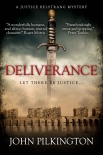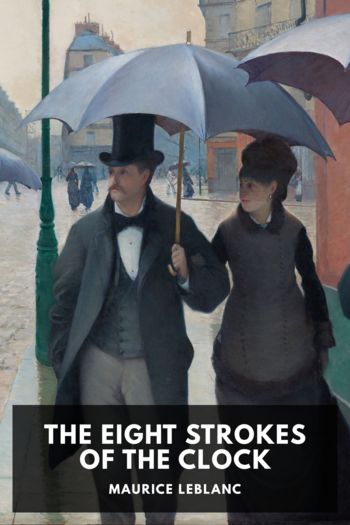Deliverance: A Justice Belstrang Mystery by John Pilkington (top 10 most read books in the world .TXT) 📗

- Author: John Pilkington
Book online «Deliverance: A Justice Belstrang Mystery by John Pilkington (top 10 most read books in the world .TXT) 📗». Author John Pilkington
In the middle, on the gelding I had borrowed from Justice March, rode Peter Willett. His hands were bound before him, allowing only enough leeway to enable him to hold the reins. For good measure his thighs were laced to the stirrups; no chances would be taken to allow the man to escape. Despite his wound, he was calm and stolid.
Jonas Willett’s name was all but forgotten, nor did I see him again. Later I would learn that the man had sold his foundry and retreated to his cottage, where he died soon after, in pain and grief. And as our subdued group left the village, I could not help feeling that after all that had happened, the Forest of Dean would be glad of our departure.
Yet in two respects our journey had borne fruit: if it had failed to bring back the wanted men, Tobias Russel and Captain Spry, it had at least produced John Mountford’s murderer, which I hoped would afford some comfort to his brother. And more, it had succeeded in diverting this ex-magistrate’s thoughts from the matter of his losing his home at the whim of our profligate monarch.
I have said elsewhere that, despite King James’s titles and accomplishments - peacemaker, father of princes and author of books on kingship, tobacco and witches - I have other names for him.
Mercifully enough, the journey up to Gloucester was uneventful. We took it slowly, occasioning stares as we passed through the villages en route, but without stopping. Rests were taken on the open road, the horses fed and watered at streams. And all the while, Peter Willett sat his mount without a word.
In truth, I was now uncertain as to whether the man would talk, which troubled me with regard to uncovering more names: I speak of the Concord Men. It could be that Willett only knew Francis Mountford, who was unlikely to have told him more than he needed. I spoke of it to Parry in the late afternoon as we left Highnam village, with but a few miles of travel remaining. But he was uncommunicative, saying that it was a matter for Justice March, or perhaps for the keeper of the gaol. It was clear that the sergeant wished only to rid himself of his prisoner as early as possible… for which, I found, I could hardly blame him.
In silence, tired and saddle-weary, we at last entered Gloucester. On arrival I went with Parry to deliver Peter Willett to the castle, into the hands of Daniel Gwynne. It was a brief meeting: I had no desire to converse with that man, saying only that I would hand my report to the Justice. After the sergeant had supplied Gwynne with the bare details of Willett’s offence, he accompanied me outside to make his farewell.
‘I pray you, don’t berate yourself too harshly,’ I said to him. ‘Though I cannot condone what you did, you might have lost your own life upon the salt-marsh, or even at the Willetts’ house. More, the men we went to apprehend were, at the final throw, but small fish in the pond. Your prize – the murderer of John Mountford – is worth a deal more. He may yet be the key to the cracking open of a conspiracy, greater than either of us had imagined.’
Alas, the man was inconsolable. His task now was to take the bodies of two of his trusted men to their families. He even spoke of quitting his post thereafter. In the end we parted with a brief handshake, before I got myself mounted again and rode the short distance to Thomas March’s house.
And it was there that matters took a somewhat unexpected turn, which I am eager to relate.
***
After supper, mighty glad to feel rested and clean, I spoke at length with my host about the whole affair. He had by now read my complete report, and was confounded by it.
‘Treason,’ he muttered, for the third or fourth time. ‘The most heinous of crimes – and committed by supposedly loyal Englishmen. In truth I have my suspicions, yet we only know one name for certain: that of Francis Mountford. Clearly he is the one to be confronted, to discover who else makes up this villainous cohort – these so-called Concord Men.’ He paused, before favouring me with a wry smile. ‘However, since we last met, I have not been idle.’
He went on to tell me that he had written to the High Sheriff of Gloucester as well as the Chief Justice in London, who had the ear of the King. His Majesty, in fact, was now returning from his summer progress, and Whitehall was abuzz. In short, unbeknown to me, things had begun to move. And as for the unfolding crisis in Europe…
‘Frow what I hear, it’s true enough that a war is building, Robert,’ March said with a sigh. ‘Spain is sending money to support the Archduke’s troops in Bohemia. You may be aware that a number of the landowners in the Forest of Dean are papists – recusants, like old Sir Edward Wintour. He’s related by marriage to the Marquis of Worcester, of Raglan Castle – and his oldest son will inherit his ironworks. Men like those may indeed be bold enough to aid the forces of the Emperor, as your Spanish informant admitted – and they’re well placed to supply ordnance. But they would have to do it secretly, through lesser men like Mountford, who are prepared to take great risks for substantial reward.’
‘And behind the back of his own father,’ I said, with some bitterness. In my mind’s eye I saw again the handsome, cool-headed man who had spoken gravely of Sir Richard’s frailty,





Comments (0)